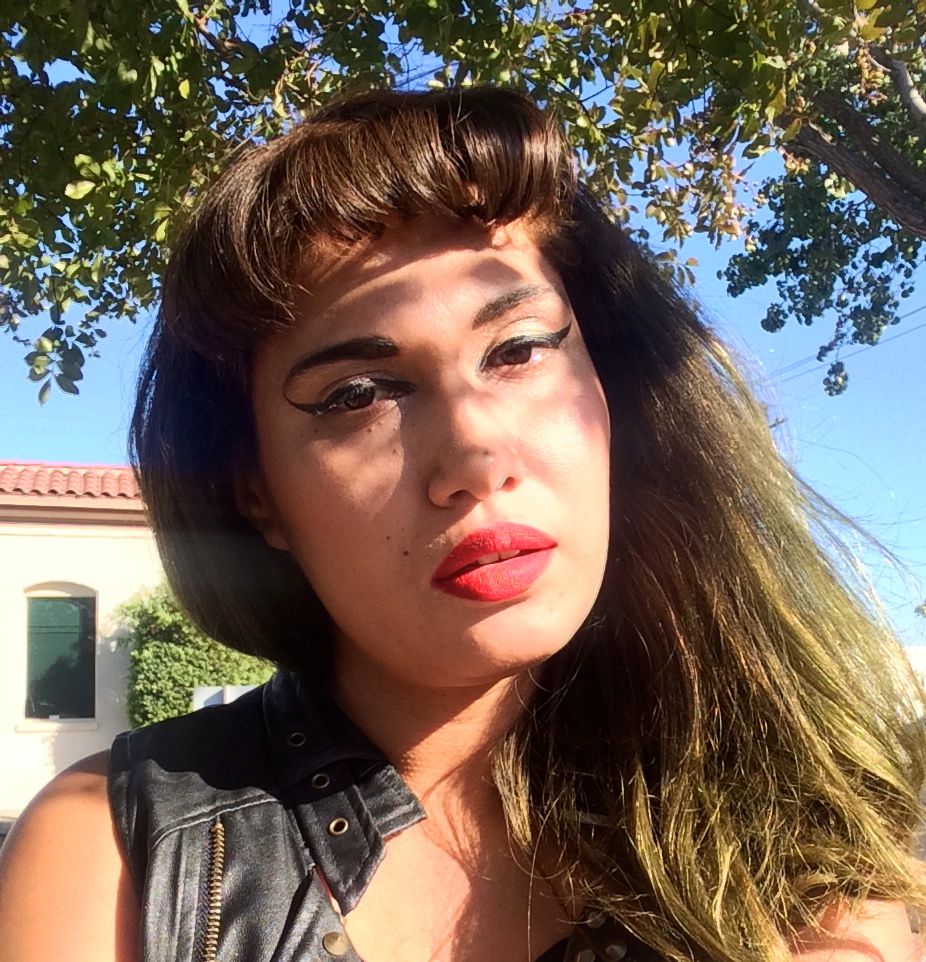I’ve always had an affinity for the glam. When I was a little girl in the early ‘90s, my mother would rent me old VHS movies like A Place in the Sun. The image of Elizabeth Taylor leaning over the pool table in her white strapless dress is seared into my skull. When she makes her way over to Montgomery Cliff, the soft rustle of her tulle really gets to me. As a brown girl, I definitely didn’t grow up with skin privilege, but I did have other privileges. My family did just fine when it came to money. My mother bought me clothes at department stores and boutiques, yet she scrutinized sales tags and even haggled the salespeople the way you’re allowed to in Europe.
Read MoreWhat Does a Fictional Witch Look Like in 2016?
When it comes to fiction about witchcraft, the canon is limited. That much is obvious.
Read MoreWatch Marilyn Manson Read William Blake
BY LISA MARIE BASILE
WELP, here's Marilyn Manson reading William Blake's Proverbs of Hell. (You can read along below). Happy Halloween.
Read along:
The Proverbs of Hell, from The Marriage of Heaven and Hell by William Blake
In seed time learn, in harvest teach, in winter enjoy. Drive your cart and your plow over the bones of the dead. The road of excess leads to the palace of wisdom. Prudence is a rich ugly old maid courted by Incapacity. He who desires but acts not, breeds pestilence. The cut worm forgives the plow. Dip him in the river who loves water. A fool sees not the same tree that a wise man sees. He whose face gives no light, shall never become a star. Eternity is in love with the productions of time. The busy bee has no time for sorrow. The hours of folly are measur’d by the clock, but of wisdom: no clock can measure. All wholsom food is caught without a net or a trap. Bring out number weight & measure in a year of dearth. No bird soars too high, if he soars with his own wings. A dead body, revenges not injuries. The most sublime act is to set another before you. If the fool would persist in his folly he would become wise. Folly is the cloke of knavery. Shame is Prides cloke. ~ Prisons are built with stones of Law, Brothels with bricks of Religion. The pride of the peacock is the glory of God. The lust of the goat is the bounty of God. The wrath of the lion is the wisdom of God. The nakedness of woman is the work of God. Excess of sorrow laughs. Excess of joy weeps. The roaring of lions, the howling of wolves, the raging of the stormy sea, and the destructive sword, are portions of eternity too great for the eye of man. The fox condemns the trap, not himself. Joys impregnate. Sorrows bring forth. Let man wear the fell of the lion, woman the fleece of the sheep. The bird a nest, the spider a web, man friendship. The selfish smiling fool, & the sullen frowning fool, shall be both thought wise, that they may be a rod. What is now proved was once, only imagin’d. The rat, the mouse, the fox, the rabbit: watch the roots; the lion, the tyger, the horse, the elephant, watch the fruits. The cistern contains; the fountain overflows. One thought, fills immensity. Always be ready to speak your mind, and a base man will avoid you. Every thing possible to be believ’d is an image of truth. The eagle never lost so much time, as when he submitted to learn of the crow. ~ The fox provides for himself, but God provides for the lion. Think in the morning. Act in the noon. Eat in the evening. Sleep in the night. He who has suffer’d you to impose on him knows you. As the plow follows words, so God rewards prayers. The tygers of wrath are wiser than the horses of instruction. Expect poison from the standing water. You never know what is enough unless you know what is more than enough. Listen to the fools reproach! it is a kingly title! The eyes of fire, the nostrils of air, the mouth of water, the beard of earth. The weak in courage is strong in cunning. The apple tree never asks the beech how he shall grow, nor the lion, the horse, how he shall take his prey. The thankful reciever bears a plentiful harvest. If others had not been foolish, we should be so. The soul of sweet delight, can never be defil’d. When thou seest an Eagle, thou seest a portion of Genius, lift up thy head! As the catterpiller chooses the fairest leaves to lay her eggs on, so the priest lays his curse on the fairest joys. To create a little flower is the labour of ages. Damn, braces: Bless relaxes. The best wine is the oldest, the best water the newest. Prayers plow not! Praises reap not! Joys laugh not! Sorrows weep not! ~ The head Sublime, the heart Pathos, the genitals Beauty, the hands & feet Proportion. As the air to a bird of the sea to a fish, so is contempt to the contemptible. The crow wish’d every thing was black, the owl, that every thing was white. Exuberance is Beauty. If the lion was advised by the fox, he would be cunning. Improvement makes strait roads, but the crooked roads without Improvement, are roads of Genius. Sooner murder an infant in its cradle than nurse unacted desires. Where man is not nature is barren. Truth can never be told so as to be understood, and not be believ’d. Enough! or Too much!
Via Poets.org.
Halloween Wishes — From Luna Luna
BY LISA MARIE BASILE
Happy Halloween, dear readers! Our little digital coven hopes you have a magical evening.
Halloween completely embodies Luna Luna's vision — we love when the dark mixes with the light, when the veils come undone. On this day, we're vulnerable and curious and empowered by the night. And on this day, we are free to practice magic without a second glance. But really, we're making magic all year — witchcraft isn't always lavender and candles and alters. Sometimes it's being a strong woman without apologies. Sometimes it's manifesting so hard that reality changes.
The witch has always been such powerful symbol for me. Right now, she's a popular figure...and that's great. But she's eternal, regardless of trend or clever PR. For me — and probably for a lot of us — she's a symbol of strength, resilience and autonomy. Being a witch means honoring the women (either witches or just everyday women) who had no choice but to admit their "sins" or die refusing to lie. This is powerful and haunting. We should never forget that women throughout the world have been prosecuted for what essentially boils down to men/society's fears of what is different or strange or powerful. I embrace the label because I *do* live in world where I have a choice and because I live by the teachings of powerful, magical women who manifest their dreams.
And I am consistently inspired by the amazing people who write and edit for Luna Luna. It's magical, and we invite you into our coven....
We hope you have a safe and spectacularly spooky Halloween night. We love you!
The Scary Connection Between Donald Trump & Macbeth
As the Trump campaign’s self-implosion continues, and the candidate increasingly lashes out, many have pointed to historical parallels: Hitler in the bunker, Nixon at the height of Watergate. But for me, the figure who comes to mind is not a politician but a literary character: Shakespeare’s Macbeth. Macbeth, whose “vaulting ambition” led to murder, civil war, and his own eventual destruction. Now I’m not saying that Trump has murdered anyone (Don’t sue me, Donald!), but the parallels are there.
Read MoreAll photos by LEAH BANK
Femmequerade: The Witch Ball Recap
BY LIZ VON KLEMPERER with PHOTOS BY LEAH BANK
On October 25, Greenpoint’s Good Room was transformed into a femme haven for the second Femmequerade Ball. The mission of the gathering was to both rally against toxic masculinity and honor the divine feminine through music, dance and revelry. In keeping with this philosophy, admission fee was $18 for cis straight white men, and $15 for everyone else.
By 8 p.m. a smog machine puffed ample smoke onto the dance floor, which was illuminated by a glittering disco ball. Pointed witch hats bobbed in the throng as femmes swayed together. Organizers Raechel Rosen and Coral Foxworth flitted around the room, setting the tone by lighting incense and candles.
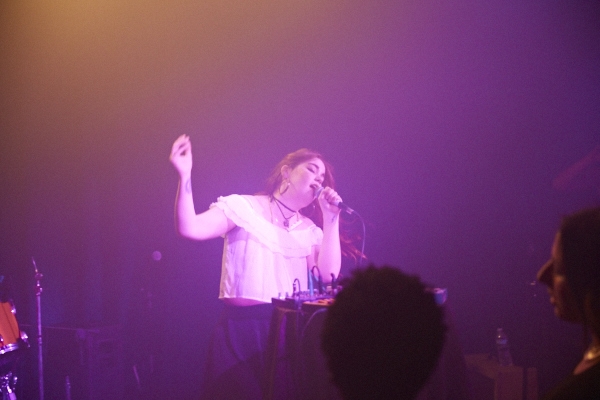
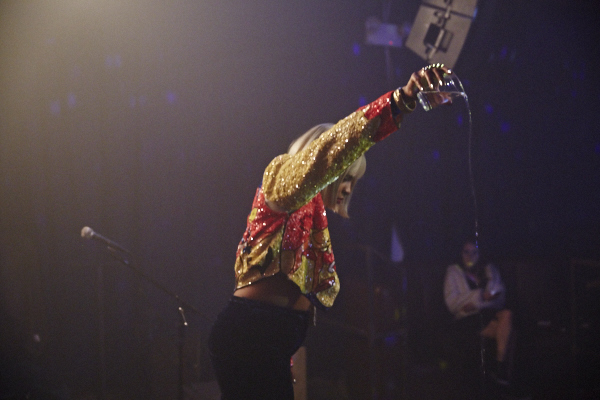
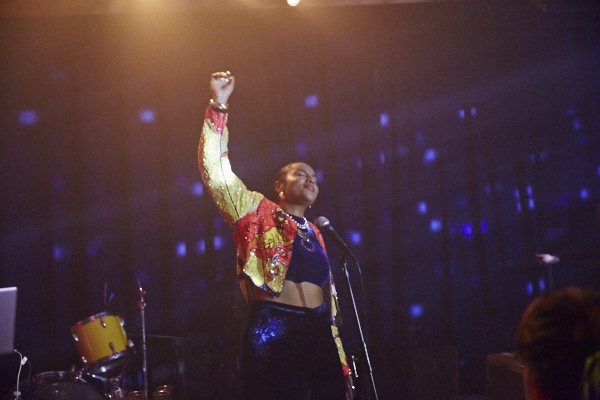

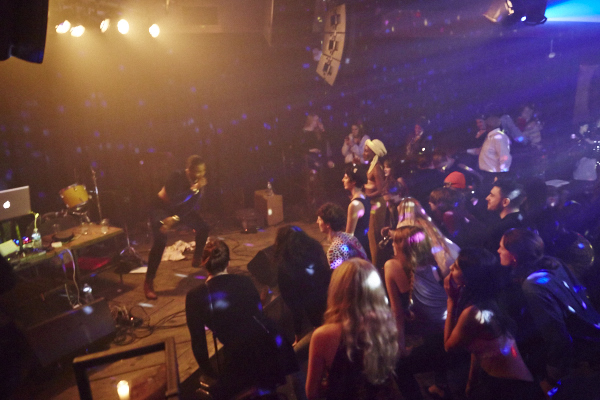
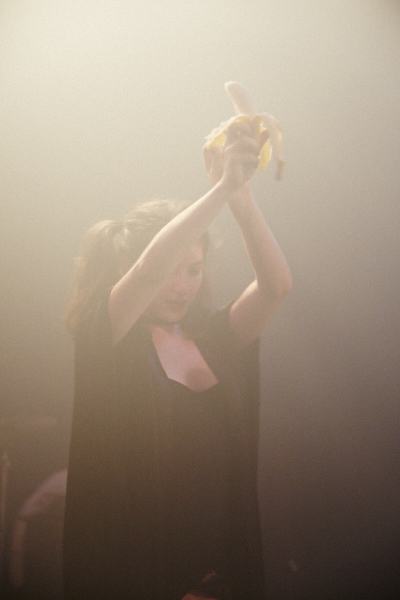
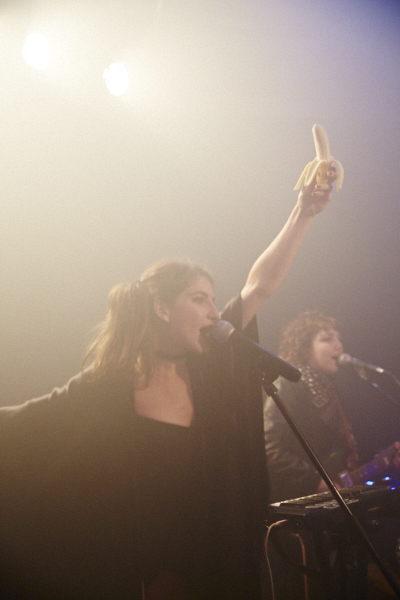
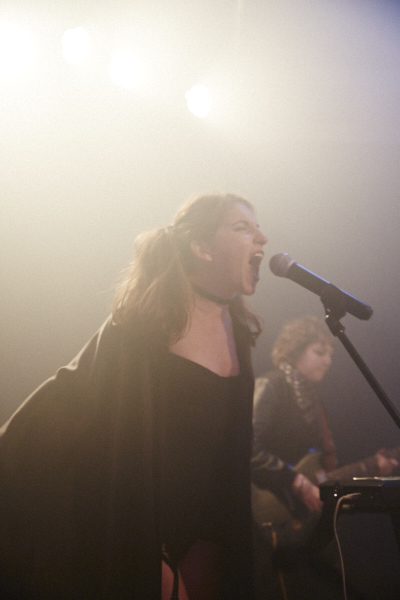
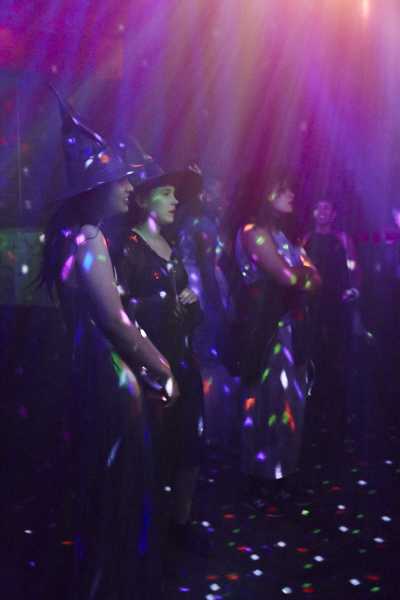
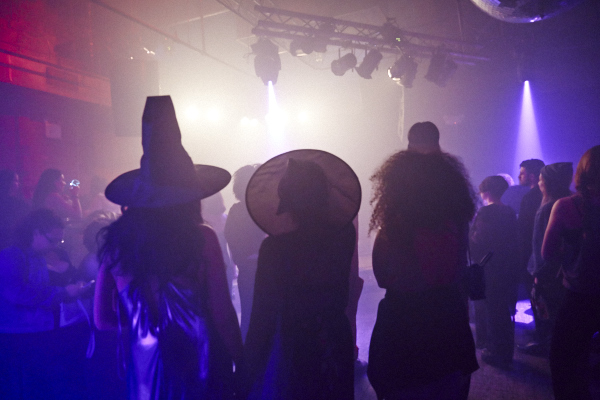
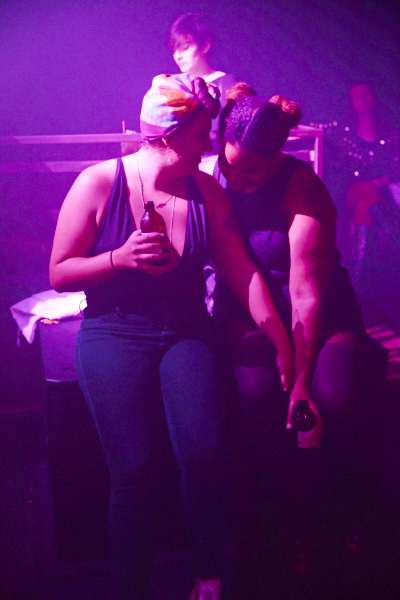
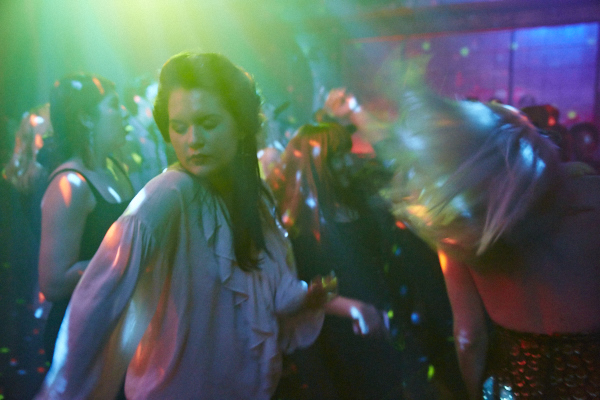
“Everything came together around the full moon,” Foxworth, also known as FXWRK, says of the planning process. The success of first Femmequerade Ball, which was held on August 18, attracted artists such as Anna Wise, Latasha Alcindor, and more to join forces for the second installment.
Raechel Rosen, who doubles as the lead singer and keytarist of her band Mima Good, got on stage after Yatta Zoker. Raechel beckoned for the crowd to come closer, and began to sing her witchy brand of rock and roll. Her final song, American Finger Trap, featured her signature onstage move: slowly peeling a banana and circumcising it with a pair of scissors. Much of Rosen’s artistic practice is dedicated to combatting rape culture and empowering survivors by through voicing trauma.
“Politically I think it’s fucked up the way that we’re taught to deal with sexual assault in our culture,” Rosen explains. “The victim has this secret to bear. She has to go be in support groups, get therapy and deal with PTSD. People treat it like you’ve caught this sickness and you can’t say who gave it to you. It’s as though it’s your personal secret, where in reality it’s the secret of the assaulter.”
Attendees seeking a brief respite from the high-energy dance floor could dip into Greenroom’s second smaller room. The space was occupied by Catland, a Brooklyn bookstore which supplies spiritual goods such as candles and crystals. Books about the occult were for sale, along with other memorabilia. Catland practitioners were also available to give tarot readings.
Next Latasha Alcindor, also known as L.A., took the stage. She began with a ritual in which she splashed water around the stage and then launched into a spoken word piece about the power of witchcraft and her Caribbean heritage. L.A.’s last song was about her neighborhood, and the all too prevalent phenomenon of gentrification.
“I’ve never played this in front of anyone before,” she confessed to the audience.
“To be honest, it feels odd to sing this song in front of a group of white people. But it’s important, so I’m going to do it.”
The rap was raw and authentic. L.A.’s face knit with a palpable anguish as she sang about the displacement her hometown has had to face. The crowd erupted in applause.
Headliner Anna Wise prefaced her performance by affirming the intention of the event.
“I’m all about this cause,” she said, addressing the crowd.
“This period of time is marked by the uprising of the oppressed,” she continued. “That includes femmes, and it also includes racial minorities.”
Wise’s awareness is in part influenced by her experience working with Kendrick Lamar on his latest album, To Pimp a Butterfly, which she described as one of the most pro black albums of 2015. Wise then launched into her hit songs BitchSlut and Precious Posession. During her last song she hopped off the stage and danced amongst the crowd.
The DJs that spun after the live music portion of the event included FXWRK, DJ Dylan Sparkle, Abyss X and WWIII.
What can we expect of the next Femmequerade? The goal for the series, Foxworth says, is to, “create a space to imagine interaction outside of previous oppressive contexts. It’s also a place to play, because play is a really important and underutilized aspect of social change and activism. That’s why we dressed up. It’s a ball, it’s a spectacle, it’s tapping into an almost childlike energy in all of us, and I think that’s the kind of energy we need to heal.”
Liz Von Klemperer is the author of the unpublished novel Human Eclipse. Liz is a staff writer for Art Report, and has work featured in Autostraddle, Bust, Electric Literature, Luna Luna Mag, Hooligan Mag, and Breadcrumbs Mag. Visit her at lizvk.com.
Leah Bank is a Brooklyn based photographer, possibly from Mars, who enjoys late night cupcake baking and climbing rocks. She has work featured in BUST Magazine, F-Stop Magazine, and American Photography. Find her at www.leahbank.com.
All The People Who Like Luna Luna, #1
Thanks Teen Vogue! Thanks MSN! Thanks Huffington Post! Thanks Autostraddle!
Read MoreDave Heath
Get Out & Vote — How Many Have Died For This Right?
It was several years later I learnt black South Africans didn’t get their right to vote till 1994. I remember seeing photos on TV, photos of people lining for up to twelve hours at times to cast their ballots, a first for many, an experience Joyce’s parents never got to have. Imagine, that in 1994, the rest of us were watching Forrest Gump and Pulp Fiction. This was not that long ago.
Read MoreJordan Whitt
The Bruja Handbook, Fiction by Rios de la Luz
Rios de la Luz is a queer xicana/chapina living in Oregon. She is brown and proud. She is in love with her bruja/activist communities in LA, San Antonio and El Paso. She is the author of, The Pulse Between Dimensions and The Desert via Ladybox Books. Her work has been featured in Vol. 1 Brooklyn, Entropy, The Fem Lit Magazine, World Literature Today and St. Sucia.
Read MoreVia here.
5 Types of Sexists at a Poetry Reading: A Taxonomy
Let’s put these sleaze-balls back into the dusty, forgotten books where they belong.
Read MoreAndrew Amistad
Poetry by Phoebe Rusch
Phoebe Rusch is a Zell fellow in fiction at the University of Michigan, where she has received Hopwood awards in screenwriting and non-fiction. She is working on her first novel. Her essays also appear on the World Policy Journal blog and in Luna Luna. She blogs at https://phoebecrusch.wordpress.com/
Read MoreHate Trump? Watch This Over and Over and Over Again
You're welcome.
Evelyn Garcia
Flash Fiction by Valerie Marie Arvidson
Marianna, Yevda, and Nadya are shivering up there in the sky, (like three jewels jittering inside their flying crowns, or coffins, depending on their fate). Marianna is known as the Sapphire because she is blue eyed; Yevda is the Emerald, green eyed, and Nadya is the Ruby (with brown eyes and red hair). Their fairy tale is one of war and of witches, of poverty and prettiness, of lightness and speed, of secret terror and secret victory. Their enemies call them the Nachthexen: night-witches.
Read More4 Existential Poetry Collections You Should Read
Etel Adnan, Tizio Fratus, Nicelle Davis, Leah Silvieus
Read MoreA Look Back at AWP 2016 Through Caramel-Colored Glasses
BY MIGUEL PICHARDO
Outrage is exhausting. Three-day conferences in a different time zone are just as taxing. With plenty of collective outrage leading up to the 2016 AWP (Association of Writers and Writing Programs) Conference in Los Angeles, I had to conserve my energy.
I understand that there was plenty to rail against—culturally-deficient committees, poor accessibility, the tactless exploitation by Vanessa Place made worse by Kate Gale’s ranting—but I didn’t travel across the country to be swept up in polemics. When holding a conference in such melting pot of a city whose history has been marred by racial tumult, the Association could no longer afford to ignore the groups they’ve alienated in past years. And I couldn’t bring myself to knock the Association for trying. So, I loosened my brown fist into an open hand, tucked my soapbox under the table at my lit mag’s exhibit, and prepared to make the most of a conference where, for once, I felt welcome.
If you’ve ever been to an AWP Conference, you know that there are so many panels and events going on at the same time that you might wonder how far human cloning technology has come in recent years. Had I a team of extra Miguels, I would’ve attended everything on the schedule that spoke to me as Latino writer of poetry and fiction—maybe. Here’s some of what one Miguel managed to catch at the 2016 AWP Conference:
Panel Discussion: “Creating Opportunities for Writers of Color: A Continued Urgency”
Seated at the head of a hotel conference room were Reginald Flood, Diem Jones, Elmaz Abinader, Angie Chuang, and Angela Narciso. All of these authors have in one way or another dedicated their writing lives to circumvent “the perils of publishing in white institutions.” Abinader and Jones are two of the four founders behind VONA Voices, the only writing conference/workshop in the US that focuses on multi-genre work produced by writers of color. As of last summer, VONA left San Francisco and has made Miami its new home. Flood, Chuang, and Narciso have been involved with Willow Books, an independent press that strives to promote diversity in publishing by recognizing outstanding writers of color.
The panelists asserted that, as a community, writers of color can work towards creating an “alternate canon” worthy of inclusion in national and literary discourse. The aim then is not “diversity”—a word the panelists agreed is white, politically correct code for racism—but “equity,” as put forth by Narciso. Chuang then spoke on how writers of color should avoid becoming monoliths, self-absorbed loners who have forgotten that art can build bridges between communities.
When Jones pointed out that traditional pedagogy sometimes doesn’t work for writers of color, I realized that instead of writing for just anyone who will read our work, we should be writing for readers of color instead. Before I penned my first poem, I was an English major who couldn’t stomach the Bard and whose aspirations were forever changed after reading Junot Diaz’s Drown. I didn’t find this collection in any classroom; it switched hands between me and some of my Dominican friends at St. John’s University. I then passed it on to a group of high school students I was mentoring at the time. Re-education is not only possible; it’s necessary if we wish to turn the status quo on its head.
Before fielding questions from the audience, Abinader urged the writers of color in the room to fill in the “hollowness of diversity’’ by nurturing their individual voices and to always “make them [white people] uncomfortable.”
Will do, Elmaz. After all, change is hardly change unless it’s uncomfortable.
Reading: “Throwback Thursday: Four Forms of Performance from the Early 90s Nuyorican Poets Café”
Four years ago, when I still lived in New York, I’d often check out a reading or a slam contest at the hallowed literary hub that is the Nuyorican Poets Café. I’d sometimes take my high school students along as a field trip. More than once, they left the café so inspired that they’d recite their own poems on the R train back to Queens. The panel at this year’s AWP showed me that the Nuyorican still has that same impact on young poets.
An institution of Manhattan’s Lower East Side, the Nuyorican has been home to a community of poets since 1975. The AWP readers—Xavier Cavazos, Ava Chin, Crystal Williams, and Regie Cabico—represented a living snapshot of the Nuyorican’s 90s heyday. Since then, they’ve earned fellowships and PhDs, won national slam competitions, appeared on HBO’s Def Poetry Slam and NPR’s Snap Judgment, and of course, published multiple books. However, they all agreed that none of their achievements would’ve been possible without the Nuyorican, their “first MFA.”
Each poet recited a piece and followed it with some recollection of what the Nuyorican did for them as budding artists. Cabico, a queer Filipino American slam poet, said that without the Nuyorican he would have been a massage therapist or a lawyer. Chin credited the Nuyorican with giving her the space to explore language as a first generation Chinese American. Williams broke down the three lessons she learned about slam at the Nuyorican:
1. If you’re going to read a poem, then read a poem. Make sure that it has all the craft and technical considerations that go into creating poetry that is meant to be read aloud.
2. Slam with the intention to connect with your audience.
3. Come original. Be your full-throated self.
Last, and most memorable, was Cavazo’s reading. Taking a cue from Williams’ lessons, he launched into a hilarious poem titled “Motherfuckers” without the delay of unnecessary preamble. The piece was a tirade against Miami Marlins’ former manager, Ozzie Guillen. No matter where I go, the 305 follows. But his poem is not what stuck with me. Recalling his days as an addict, Cavazo said he owes his life and his sobriety to the friends he made within the Nuyorican’s brick walls, his fellow panelists. Teary-eyed, he reminded us that, “Slam is not an aesthetic; it’s a community. Keep it whole. Keep it beautiful.”
A Q&A followed, unlike any I’d ever seen. A Japanese American teen from Orange County raised his hand not to ask a question, but to make a request. He had a slam competition coming up, and was wondering if he could practice his piece for the audience. The panelists could not have been happier to oblige and invited him on-stage. As he read, I was reminded of my students back in New York. It was a relief to see, to hear that the oral tradition of slam poetry is alive and well from coast to coast, as relevant today as it was in the 90s.
The Latino Caucus
This year, the Association’s efforts to be more inclusive were apparent without coming off as pandering. Special accommodations were made for disabled attendees and panel titles were rife with acronyms like WOC and LGBTQ. The most apparent reforms could be seen in this year’s caucuses. At the end of the conference’s first two days, caucuses were held where groups of writers communed to discuss the challenges and opportunities their demographics face in the current publishing landscape. Caucus groups included writers in low residency MFA programs, Indigenous American writers, Asian American writers, and writers in recovery. One caveat about these caucuses was that many were held simultaneously. So someone who identified as say, a queer woman who teaches high school, would’ve had to prioritize one of these identities as her way into a larger community of writers.
I attended the Latino caucus where each panelist represented a different facet of the literary world. Emma Trelles, an alumna of FIU’s MFA program, spoke for the journalistic obligations a community of Latinx writers has in order to foster an atmosphere of good literary citizenship. She urged us to query editors for reviews on books by Latinx authors, and to cover each other’s events. Francisco Aragon, director of Letras Latinas at Notre Dame, suggested ways we can foster relationships with existing institutions in order to create literary programming and events focused on works by Latinx authors. Co-founder of the poetry workshop CantoMundo, Deborah Paredez invited us to “self-interrogate” in our work as a means of surveying the isolation we experience inside and outside of institutions. Moreover, she reminded us that “we are not exceptional Latinos; we’re representative of them.”
Lorenzo Herrera y Lozano, editor of several Latinx anthologies, posed the important question: “What would it take to publish ourselves into being?” The answer was provided by the following panelist, Ruben Quesada. Representing the literary magazine world, Quezada has held decision-making positions for publications like Codex Journal and the Cossack Review. Whenever he noticed a lack of Latinx representation in literary magazines, he either started his own or changed a predominately white one from the inside through what he called “deliberate editing.”
Quezada’s talk resonated with me especially. As the Latino editor of a literary magazine, I’d love to edit deliberately, but we simply don’t receive too many submissions from Latinx writers. During the Q&A, I made this known to a room full of strangers who looked like me, who spoke my first language. Before the Latino Caucus was over, my magazine’s Facebook page saw a surge in likes and the inbox was hit with questions about submission guidelines and book review queries.
If that’s not community, I don’t know what is.
Despite the overwhelming kinship and empowerment I felt in that room, I knew this could be the first and last Latino Caucus to ever be held at an AWP Conference. Sure, Latinx authors are as visible as ever, but being visible and being sustainable are two different feats. Before this caucus becomes an annual event, the Association asks that we jump through a series of hoops. For one, there must be panelists to preside over future Caucuses, each of whom have to have attended the last three consecutive AWP conferences as paying members. Also, the Association wasn’t concerned with how many people attended the Caucus; they just wanted the minutes when it was over. Only after the third Latino Caucus, to be held in 2018, does it become a permanent panel on the conference schedule.
Regardless of the shaky foundation the Latino Caucus stood upon, I still felt that I’d found my literary tribe, one I never knew could be available to me.
Off-site Event: The Bash hosted by The Conversation
This event could not be found on any official AWP listing. Invite only. I came as a dear colleague’s plus one. After enduring a lame, ill-planned reading, we called an Uber to take us to Ladera Heights, AKA the Black Beverly Hills. Live drums and saxophones could be heard as we pulled into the driveway of one of the nicest houses I’d ever been invited to. We were greeted at the door by our co-host’s father, Mr. Barnes. Inside, the rooms were adorned with paintings and wall-to-wall bookshelves brimming with knowledge. I imagined that this must’ve been such a nurturing environment for a poet like Aziza Barnes to call home.
I leaned over to my colleague and whispered, “I wish Mr. Barnes was my dad.”
Mr. Barnes gave us the lay of the land: where to find the booze, the coffee, the snacks, and the pièce de résistance, the taco bar. The hospitality was on one hundred thousand; I was exactly where I needed to be.
The band played Motown classics as I made trip after trip to the taco bar. I spoke with young black, white, and Latinx poets from all over the country. I even reunited with a poet from Mississippi I met during the 2015 conference. We agreed that the Association had taken the hint since last year in Minneapolis, where the melanin-deficient panels and attendees made us seriously question what we were doing there in the first place.
I struck up another conversation with a black poet and PhD candidate from Flint, Michigan. Maybe it was the festivities, but like me, he was overjoyed to see so many writers of color sharing such a memorable night. He told me about Claudia Rankine’s moving keynote address, which I’d missed the night before. We exchanged email addresses and poems. The band played their last notes and then we heard the announcement, “They’re going to read.”
An unveiling was upon was, the reason why we’d all come together. Nabila Lovelace and Aziza Barnes had organized The Bash as the joyful inauguration of a new literary institution they’d founded and dubbed “The Conversation.” The organization’s mission is to “carve out a space for Black Americans to contend with their Blackness and its infinite permutations in the South.” Lovelace and Barnes wanted to turn the literary conference model on its head, and by throwing The Bash, they had done so beautifully, in a manner no POC I know could resist: the house party.
Our hosts stood silently in front of their mic stands, commanding us with their presence before either of them spoke. Lovelace’s head was wrapped in a soft cloth and Barnes wore a plaid blazer, dreads draped over her shoulder. Barnes thanked all of us for attending and stressed the importance of coming together outside of the Association’s confines. She went on to read a poignant piece about being harassed by LAPD outside of the very house we were gathered in—the house she grew up in.
After the reading, the band packed up their equipment. Yet, the party was far from over. A DJ set up his gear and turned the Barnes living room into one of those basement parties from my high school days. The lights were low, the floor was shaking, and bodies moved to anthems like Montell Jordan’s “This Is How We Do It” and Juvenile’s “Back That Azz Up.” When Dark Noise Collective poets Danez Smith and Nate Marshall busted out a flawless “Kid ‘n Play” in the middle of the dance floor, the crowd lost it.
I swayed to the music, getting by on my two left feet and reveling in the ruckus we were busy making. Amid a conference that was anything but silent, the noise of change had been a low hum since I arrived in Los Angeles. Here, at The Bash, it reached its crescendo.
The DJ threw on Kendrick Lamar’s “Alright,” and played it loud. All of us chanted the chorus together, “We gon’ be alright/ Do you hear me, do you feel me? We gon’ be alright.”
I couldn’t agree more.
Like this article? You should try: Breaking the Cultural Ties That Bind Us
Miguel Pichardo is a Dominican/Ecuadorian writer out of Miami. His poetry has appeared in Duende and Literary Orphans. He is currently an MFA candidate at Florida International University and the editor of Fjords Review.































